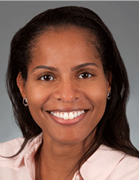Interview With 2016 ASH-AMFDP Recipient Natasha M. Archer, MD

Dr. Natasha Archer is a physician at the Dana-Farber Cancer Institute and instructer in pediatrics at Harvard Medical School. She received her medical degree from Yale University School of Medicine and completed a combined residency at Brigham and Women’s Hospital and Boston Children’s Hospital in Internal Medicine/Pediatrics. Dr. Archer completed a Fellowship in Pediatric Hematology/Oncology at Boston Children’s Hospital/Dana-Farber Cancer Institute. She has done extensive work in Haiti, where she established a sickle cell disease management program. Dr. Archer is one of two 2016 ASH-AMFDP recipients.
How does the research you’re currently working on tie into your research and clinical interests - sickle cell disease and global health?
I have spent the last three years helping establish a sickle cell disease clinic in Haiti. In Haiti, sickle cell disease and malaria are highly prevalent. Given hemoglobin degradation is necessary for malaria growth, I questioned whether treating my sickle cell disease patients with hydroxyurea, a medication that increases the percent of fetal hemoglobin and decreases sickle cell related complications, might influence their risk of severe malaria. This led me to propose my current project; investigating the effect of fetal hemoglobin on malaria infectivity.
How did your experience in Haiti shape your approach to practicing medicine? How did it shape/impact your current research?
In Haiti, I don’t have access to every lab test, imaging modality, and specialist as I do in Boston. I feel that has forced me to become a better clinician. I have to use the resources I have available, i.e. my own clinical exam and less specific markers or disease. This challenges me and often forces me to step out of my comfort zone. Lastly, when clinical questions arise, I know that I have to find answers in order to best serve my patients. Not surprisingly, that has led me to my current research project.
What intrigues you most about hematology/oncology and who or what encouraged you to pursue this subspecialty of medicine?
I have always been intrigued by the ability to learn so much about a patient just by looking at his or her blood cells. Blood smears are amazing.
What would you say to a young patient who shares an interest in hematology and hopes to be a researcher one day?
Hematology is a great field. To be successful as a hematologist, you must be comfortable with both clinical and basic science literature and be able to use that to guide your clinical management. No two hematology patients are alike which keeps day to day practice exciting and leaves us continuously learning.
You bring very rich experiences and a unique background to hematology/oncology. What role does diversity or a diverse workforce play in medicine today?
Diversity in the work place is essential. No matter what our background, we all bring something different to the table. If we were all the same, our thinking would never be challenged and we would be less likely to make as much progress. When I am seeing my young patients, I always bring up some aspect of my background. Sometimes that’s the fact that I played division I basketball or that I am of Haitian descent or that I lived in China for two years. I find it helps me relate to them and them to relate to me.